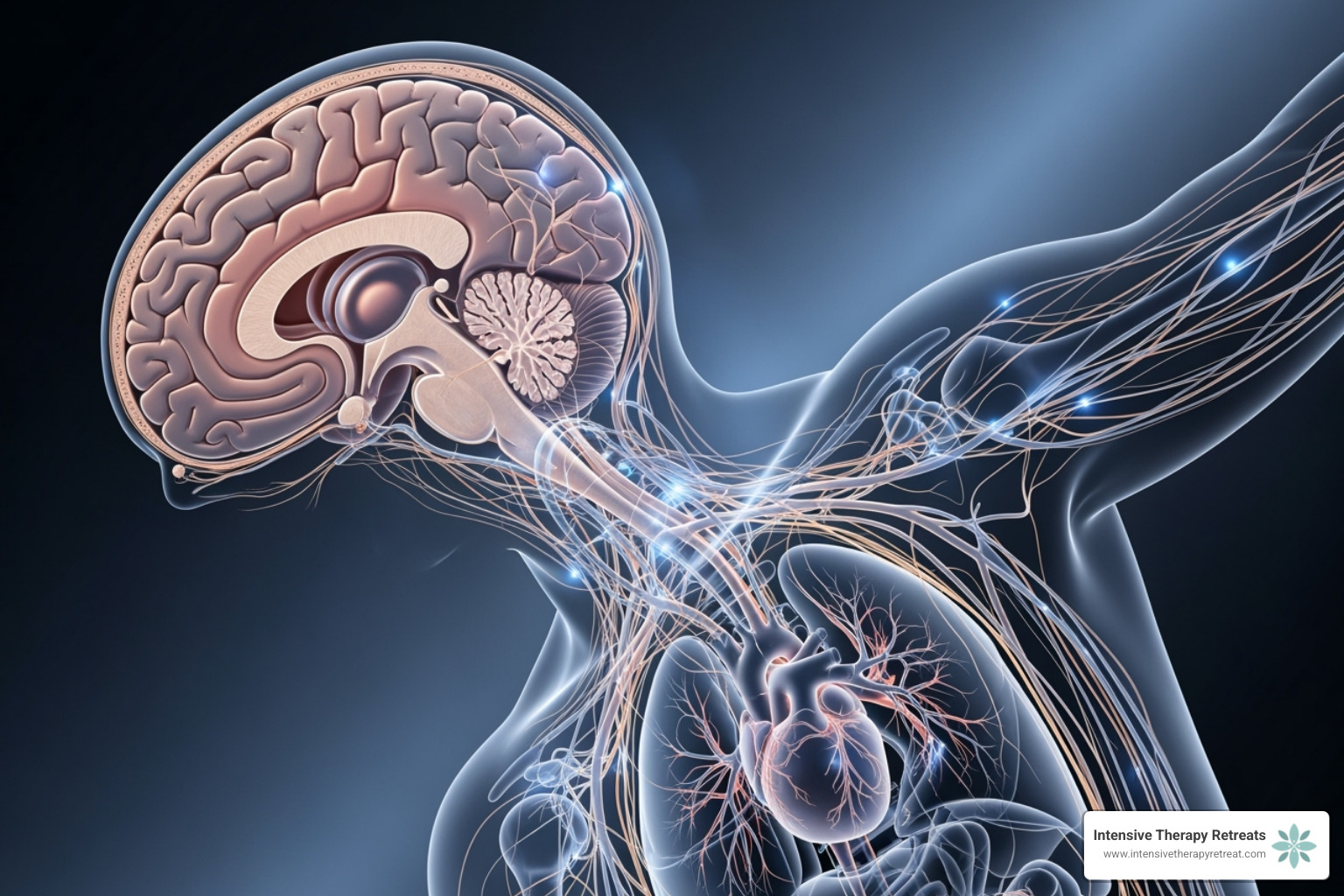Understanding the Journey of Trauma Healing for Women
Trauma healing for women requires specialized approaches that address the unique ways women experience and process traumatic events. Due to a combination of biological factors and societal pressures, women experience PTSD at nearly twice the rate of men and face a higher likelihood of events like sexual assault and domestic violence.
If you’re a woman struggling with the aftermath of trauma, you’re not alone. Recent statistics highlight a growing crisis, with sexual violence among teen girls increasing by 20 percent from 2017 to 2021. Whether you’ve faced childhood abuse, sexual assault, or other distressing events, your response is valid, and healing is possible.
Trauma creates lasting changes in the brain and body, but with the right support, you can reclaim your sense of safety and rebuild your self-worth.
I’m Bambi Rattner, Psy.D., and for over three decades, I’ve helped people heal from trauma. At Intensive Therapy Retreats, I’ve witnessed countless women transform pain into strength. This guide will walk you through your healing journey, from understanding why trauma affects women uniquely to finding the therapeutic approaches that can help.
Trauma healing for women terms simplified:
Why Trauma Affects Women Differently
Have you ever noticed how the same event can affect two people completely differently? When it comes to trauma, women often face a combination of biological, psychological, and social factors. These gender differences are rooted in real-world realities, not strength or weakness.
Biologically, women often produce higher levels of stress hormones like cortisol, which can intensify the emotional impact of trauma and make memories more powerful. Women’s brains may process traumatic memories differently, leading to more vivid re-experiencing and higher rates of dissociation. This is a key reason why women experience PTSD at nearly twice the rate of men.
Societal pressures, such as caregiving responsibilities and cultural expectations, can compound trauma’s effects. It’s also helpful to distinguish between post-traumatic stress injury (a normal response to abnormal events) and a disorder, which develops when these protective responses get stuck and interfere with daily life.
Common Types of Trauma Experienced by Women
Trauma comes in many forms, and women experience certain types of trauma at disproportionate rates.
- Sexual assault: A tragically common experience, with 1 in 5 women experience rape in their lifetime.
- Domestic violence: This creates complex trauma through betrayal, manipulation, and cycles of abuse, shaking one’s ability to trust their own judgment.
- Childhood abuse: Physical, sexual, or emotional abuse during crucial developmental years can shape self-perception for decades. Emotional neglect is equally damaging.
- Medical trauma: Difficult medical procedures, traumatic childbirth, or chronic illness can leave lasting emotional wounds.
- Relationship and Religious trauma: This can include unhealthy relationship patterns, betrayal, or manipulation within spiritual communities.
- Interpersonal violence: From workplace harassment to assault, these events can shatter one’s sense of safety.
Support for survivors begins with validating your response to any of these experiences.
The Psychological, Emotional, and Physical Impacts
Unresolved trauma lives in the present, affecting your thoughts, feelings, and physical well-being due to the mind-body connection.
- Psychological and Emotional: Trauma can manifest as PTSD, with flashbacks and nightmares. Anxiety, depression, and dissociation (feeling disconnected) are common. Feelings of shame and guilt can lead to low self-esteem, a topic explored in our guide to Healing Low Self-Worth After Trauma: A Journey of Change at Intensive Therapy Retreats Northampton.
- Physical: The body keeps the score. Symptoms can include chronic pain, gastrointestinal issues, and sleep disturbances. Understanding these Physical Symptoms of Trauma is crucial, as they are your system’s attempt to cope.
Recognizing how trauma affects women differently is the first step toward finding healing that truly works.
Pathways to Healing: Effective Therapeutic Approaches for Trauma Healing for Women
Finding your way to healing from trauma doesn’t have to feel overwhelming. The most effective trauma healing for women happens within a trauma-informed care framework. This means every interaction and therapeutic approach puts your safety and empowerment first. It’s built on principles like trustworthiness, collaboration, and cultural responsiveness, creating an environment where you feel safe enough to heal.
A strong therapeutic alliance—a relationship with your therapist built on genuine trust and respect—is the foundation for this work. Without this safety, deep healing cannot happen.
Modern trauma therapy understands that trauma isn’t just stored in your mind – it lives in your body too. That’s why many successful approaches are somatic, or body-oriented. These methods help release the physical tension and hypervigilance stored in your nervous system.
Client-centered approaches put you in the driver’s seat of your healing. You are an active participant with wisdom about your own experience. This sense of empowerment is a crucial part of recovery, especially when the trauma involved feeling powerless. If you’re ready to explore this process further, our guide on Healing Emotional Trauma offers deeper insights.
Pathways to Healing: Effective Therapeutic Approaches for Trauma Healing for Women
At Intensive Therapy Retreats, we believe in a holistic, trauma-informed approach that prioritizes your unique healing journey. Building on a foundation of safety and a strong therapeutic alliance, we use several evidence-based psychotherapies recognized for their effectiveness in trauma healing for women. Our client-centered approach ensures you are an active participant in your recovery. We also recognize that trauma is stored in the body, which is why somatic therapies are a cornerstone of our work. Learn more about our approach to Healing Emotional Trauma.
Evidence-Based Psychotherapies
We specialize in modalities designed to help you process traumatic memories, regulate your nervous system, and develop healthier coping mechanisms.
- EMDR (Eye Movement Desensitization and Reprocessing): This powerful therapy uses bilateral stimulation (like eye movements) to help the brain reprocess distressing events, reducing their emotional charge. You can find more information about EMDR therapy for reprocessing memories.
- Internal Family Systems (IFS): IFS helps you understand and heal the different “parts” of yourself affected by trauma, fostering internal harmony and self-compassion. Explore how IFS for Trauma can support your healing.
- Somatic Experiencing (SE): SE focuses on the body’s natural capacity to heal by releasing the physiological tension stored in the nervous system from overwhelming experiences.
- Cognitive Behavioral Therapy (CBT) & Dialectical Behavior Therapy (DBT): CBT helps change negative thought patterns, while DBT builds skills in mindfulness, distress tolerance, and emotion regulation.
- Expressive Arts & Body-Oriented Exercises: Creative activities and practices like yoga provide non-verbal outlets for processing emotions and help you reconnect with your body.
The Power of Specialized and Intensive Programs
For many women, weekly therapy isn’t enough to create a breakthrough. Specialized and intensive programs offer an immersive healing environment for accelerated recovery.
Imagine focusing entirely on your healing, away from daily distractions. Our Trauma Intensive Retreat allows for deep, focused treatment over a concentrated period. This unique approach means you can achieve significant breakthroughs much more quickly than in traditional therapy.
A gender-specific environment can be profoundly beneficial. Our Women’s Therapeutic Retreat creates a safe space where shared experiences are validated, fostering a deep sense of connection and understanding among participants.
Building a Supportive Ecosystem for Recovery
Healing from trauma flourishes when you’re surrounded by the right support. Trauma healing for women works best when you build a supportive ecosystem, creating connections and fostering resilience. The path forward involves reclaiming your voice, your boundaries, and your ability to feel safe. As you explore your options, you might look into our Retreats for Women Near Me located in Northampton MA, East Granby CT, Guide NY, Auburn CA, and Montreal QC.
The Vital Role of Self-Care
In trauma recovery, self-care means fundamental acts of kindness toward yourself that restore safety and control.
- Mindfulness and meditation help you stay grounded in the present moment.
- Grounding techniques, like naming five things you can see, anchor you when you feel overwhelmed.
- Movement and exercise, such as yoga or walking, help your body release stored tension.
- Healthy nutrition and sleep provide your brain and body with the resources needed to heal.
- Hobbies and creative outlets reconnect you with parts of yourself that existed before the trauma.
- Setting boundaries is a powerful act of self-care that protects your energy and is necessary for healing.
Finding Strength in Peer Support and Community
Connecting with others who understand your experience is uniquely healing. Peer support and community break the isolation that trauma creates.
In a group of women with similar paths, shared experiences create profound validation. This mutual empowerment comes from both giving and receiving support. Support groups offer safe spaces to share your story, and building healthy relationships within this community helps rebuild the trust that trauma often shatters. It’s a chance to remember what genuine connection feels like and to create a life where you can thrive.
Navigating Complexities on the Healing Path
Your journey of trauma healing for women is unique. The path isn’t a straight line, and the process is non-linear. Self-compassion is your most powerful tool during the inevitable ups and downs. Healing is a marathon, not a sprint, and being gentle with yourself is key. At Intensive Therapy Retreats, our PTSD Treatment for Women is designed to meet you where you are, honoring your unique timeline.
Addressing Co-Occurring Issues in Trauma Healing for Women
Trauma rarely travels alone. It’s often accompanied by co-occurring issues like addiction, eating disorders, or self-harm. These are not character flaws but coping mechanisms your brain developed to survive overwhelming pain.
Effective trauma healing for women must look at the whole picture. You can’t treat trauma while ignoring addiction, or address an eating disorder without understanding its traumatic roots. Our holistic recovery approach addresses these interconnected issues simultaneously. This integrated treatment leads to more lasting healing because we address the root causes, not just the symptoms.
Inclusive Healing for Diverse Identities
At Intensive Therapy Retreats, we believe healing should be accessible to every woman. Your identity and life experiences are central to creating an effective healing environment.
- Gender-diverse individuals: We welcome transgender and nonbinary individuals who feel aligned with our women-identified spaces. Our materials and language are designed to honor your identity.
- LGBTQ+ community: We recognize the additional layers of trauma that can arise from discrimination and prejudice. Our therapists create affirming spaces where your full identity is celebrated.
- Faith and spirituality: We support you in weaving spiritual or religious practices into your healing process if they are meaningful to you.
- Cultural responsiveness: We work to understand and honor your cultural background, adapting our approaches to fit your unique lens. We also acknowledge that systemic oppression can be a source of trauma itself.
By creating truly safe spaces for this diversity of women, we ensure that trauma healing for women is a carefully customized journey that honors exactly who you are.
Frequently Asked Questions about Trauma Healing for Women
It’s natural to have questions when starting your healing journey. Here are answers to some of the most common concerns about trauma healing for women.
What is a trauma-informed approach?
A trauma-informed approach shifts the focus from “What’s wrong with you?” to “What happened to you?” It recognizes that trauma symptoms are natural survival responses, not character flaws. This framework prioritizes creating a safe, supportive, and empowering environment that avoids re-traumatization. We work at your pace to rebuild a sense of safety and control.
How do I know if I need therapy for trauma?
You deserve support if trauma is affecting your daily life. You may benefit from therapy if you experience lasting emotional distress, flashbacks, nightmares, or avoidance of things that remind you of the event. Difficulty in relationships and unexplained physical symptoms are also valid signs. The key question is whether these symptoms interfere with your ability to work, maintain relationships, or enjoy life. If so, seeking a professional evaluation is a courageous step.
Can trauma be fully healed?
Yes, profound healing from trauma is absolutely possible. Healing is a process of integration, not erasure. The goal isn’t to forget what happened, but to reduce the distressing symptoms and emotional charge of those memories so they no longer control your life. Through effective therapies like our EMDR Therapy Retreats and IFS for Trauma, women can process traumatic memories, build resilience, and create fulfilling lives. I’ve witnessed countless women move from survival to truly thriving.
Conclusion: Reclaiming Your Life and Embracing a Hopeful Future
Your journey through trauma healing for women transforms into a journey of empowerment. We’ve explored how trauma uniquely affects women and the powerful, evidence-based approaches that can change your life.
Healing is possible. This is a promise backed by research and the thousands of women who have walked this path. Therapies like EMDR, Internal Family Systems, and Somatic Experiencing are proven pathways from surviving to thriving.
The strength and resilience you’ve shown just by reading this is remarkable. Now, imagine what’s possible with the right support and a safe space designed for your healing.
Taking the first step can feel overwhelming, but you don’t have to do it alone. At Intensive Therapy Retreats, our intensive approach allows you to experience significant breakthroughs in days, not years. You are part of a community of survivors who refuse to let the past define their future.
The path forward is illuminated with hope. Find how specialized Healing Retreats for Women can provide a safe and accelerated path to recovery and find what it means to not just heal, but to truly flourish. Your future self is waiting.


